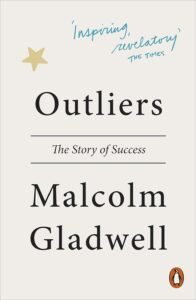“Outliers” by Malcolm Gladwell examines the factors that contribute to extraordinary success, challenging the traditional notion of the “self-made” individual. Gladwell argues that success is not just about personal effort and talent but also about external factors such as cultural background, timing, and the opportunities one receives. The book uses a series of case studies, including The Beatles and Bill Gates, to illustrate how these factors come together to create outliers—those who achieve levels of success far beyond the norm.

Key Takeaways:
1. The 10,000-Hour Rule: Gladwell popularizes the idea that it takes roughly 10,000 hours of practice to achieve mastery in a field, emphasizing the importance of dedicated practice over innate talent.
2. The Role of Opportunity: Success often depends on being in the right place at the right time. Access to opportunities—such as educational resources, mentorship, or even a specific cultural environment—can play a crucial role in one’s achievements.
3. Cultural Legacy: Gladwell discusses how cultural legacies, including the values and behaviors passed down through generations, can influence success. He explores how certain cultural traits can be either advantageous or limiting.
4. The Importance of Timing: The timing of one’s birth or the era in which one lives can significantly affect one’s chances of success, as seen in the examples of tech entrepreneurs born in the mid-20th century who benefited from the rise of personal computing.
5. Rethinking Success: The book encourages readers to rethink what it means to be successful, recognizing that individual effort is only part of the equation and that external factors and community support are equally important.






Discussion about this post